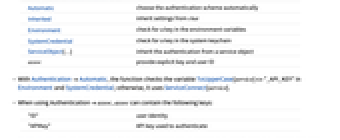ChatEvaluate[chat,prompt]
appends prompt and its follow-up to the ChatObject chat.
ChatEvaluate[prompt]
represents an operator form of ChatEvaluate that can be applied to a ChatObject.


ChatEvaluate
ChatEvaluate[chat,prompt]
appends prompt and its follow-up to the ChatObject chat.
ChatEvaluate[prompt]
represents an operator form of ChatEvaluate that can be applied to a ChatObject.
Details and Options





- ChatEvaluate is used to continue the conversation in a ChatObject.
- ChatEvaluate requires external service authentication, billing and internet connectivity.
- Possible values for prompt include:
-
"text" static text LLMPrompt["name"] a repository prompt StringTemplate[…] templated text TemplateObject[…] template for creating a prompt Image[…] an image {prompt1,…} a list of prompts - Template objects are automatically converted to message content via TemplateObject[…][].
- Prompt created with TemplateObject can contain text and images. Not every LLM supports image input.
- The following options can be specified:
-
Authentication Inherited explicit user ID and API key LLMEvaluator Inherited LLM configuration to use ProgressReporting $ProgressReporting how to report the progress of the computation - If LLMEvaluator is set to Inherited, the LLM configuration specified in chat is used.
- LLMEvaluator can be set to an LLMConfiguration object or an association with any of the following keys:
-
"MaxTokens" maximum amount of tokens to generate "Model" base model "PromptDelimiter" string to insert between prompts "Prompts" initial prompts or LLMPromptGenerator objects "StopTokens" tokens on which to stop generation "Temperature" sampling temperature "ToolMethod" method to use for tool calling "Tools" list of LLMTool objects to make available "TopProbabilities" sampling classes cutoff "TotalProbabilityCutoff" sampling probability cutoff (nucleus sampling) - Valid forms of "Model" include:
-
name named model {service,name} named model from service <|"Service"service,"Name"name|> fully specified model - Prompts specified in "Prompts" are prepended to the messages in chat with role set as "System".
- Multiple prompts are separated by the "PromptDelimiter" property.
- The generated text is sampled from a distribution. Details of the sampling can be specified using the following properties of the LLMEvaluator:
-
"Temperature"t Automatic sample using a positive temperature t "TopProbabilities"k Automatic sample only among the k highest-probability classes "TotalProbabilityCutoff"p Automatic sample among the most probable choices with an accumulated probability of at least p (nucleus sampling) - The Automatic value of these parameters uses the default for the specified "Model".
- Possible values for "ToolMethod" include:
-
"Service" rely on the tool mechanism of service "Textual" used prompt-based tool calling - Possible values for Authentication are:
-
Automatic choose the authentication scheme automatically Inherited inherit settings from chat Environment check for a key in the environment variables SystemCredential check for a key in the system keychain ServiceObject[…] inherit the authentication from a service object assoc provide explicit key and user ID - With AuthenticationAutomatic, the function checks the variable ToUpperCase[service]<>"_API_KEY" in Environment and SystemCredential; otherwise, it uses ServiceConnect[service].
- When using Authenticationassoc, assoc can contain the following keys:
-
"ID" user identity "APIKey" API key used to authenticate - ChatEvaluate uses machine learning. Its methods, training sets and biases included therein may change and yield varied results in different versions of the Wolfram Language.
Examples
open all close allBasic Examples (3)
Scope (3)
Options (10)
Authentication (4)
LLMEvaluator (6)
Specify the service used to generate the answer:
Specify both the service and the model:
By default, the text generation continues until a termination token is generated:
Limit the amount of generated samples (tokens):
Specify that the sampling should be performed at zero temperature:
Specify a high temperature to get more variation in the generation:
Specify the maximum cumulative probability before cutting off the distribution:
Specify the service and the model to use for the generation:
Applications (1)
Possible Issues (1)
Evaluating a chat session with a specific service embeds the authentication information:
With the default setting AuthenticationInherited, the authentication will not work on a different service:
Use AuthenticationAutomatic or provide explicit authentication for the new service to reconnect:
See Also
ChatObject ChatSubmit LLMSynthesize LLMConfiguration LLMPrompt LLMPromptGenerator LLMTool LLMResourceTool
Service Connections: OpenAI Anthropic GoogleGemini AlephAlpha Cohere DeepSeek Groq MistralAI TogetherAI
Related Guides
History
Text
Wolfram Research (2023), ChatEvaluate, Wolfram Language function, https://reference.wolfram.com/language/ref/ChatEvaluate.html.
CMS
Wolfram Language. 2023. "ChatEvaluate." Wolfram Language & System Documentation Center. Wolfram Research. https://reference.wolfram.com/language/ref/ChatEvaluate.html.
APA
Wolfram Language. (2023). ChatEvaluate. Wolfram Language & System Documentation Center. Retrieved from https://reference.wolfram.com/language/ref/ChatEvaluate.html
BibTeX
@misc{reference.wolfram_2025_chatevaluate, author="Wolfram Research", title="{ChatEvaluate}", year="2023", howpublished="\url{https://reference.wolfram.com/language/ref/ChatEvaluate.html}", note=[Accessed: 14-February-2026]}
BibLaTeX
@online{reference.wolfram_2025_chatevaluate, organization={Wolfram Research}, title={ChatEvaluate}, year={2023}, url={https://reference.wolfram.com/language/ref/ChatEvaluate.html}, note=[Accessed: 14-February-2026]}